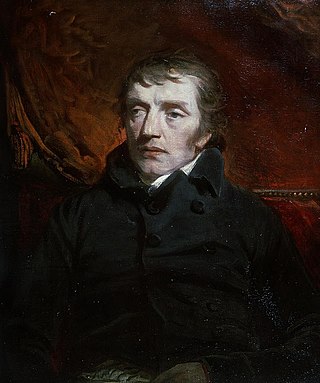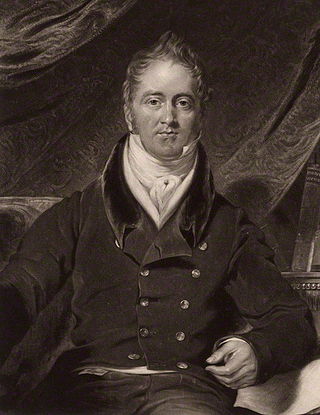
English Bards and Scotch Reviewers is an 1809 satirical poem written by Lord Byron, and published by James Cawthorn in London.

English Bards and Scotch Reviewers is an 1809 satirical poem written by Lord Byron, and published by James Cawthorn in London.
The poem was first published anonymously, in March 1809, and a second, expanded edition followed in 1809, with Byron identified as the author. The opening parodies the first satire of Juvenal.[ citation needed ]
Byron had published his first book of poetry, Hours of Idleness , in 1807. It received "strong censure" in a review by Henry Brougham, published anonymously in the Edinburgh Review . [1]
Byron was already working on a poem called "British Bards", but the review, which he (incorrectly) attributed to Francis Jeffrey, prompted him to expand its scope; he made Jeffrey "the central figure in a wide-ranging satire on contemporary practices both in writing and in reviewing". In writing it, he drew on earlier satires, including the Baviad (1791) and Maeviad (1795) by William Gifford (1791), the texts published in the Anti-Jacobin (1797–1798), the Epics of the Ton (1807) by Lady Anne Hamilton and the Simpliciad (1808) by Richard Mant. [2]
Byron used heroic couplets in imitation of Alexander Pope's The Dunciad to attack the reigning poets of Romanticism, including William Wordsworth and Samuel Taylor Coleridge, and Francis Jeffrey, the editor of the Edinburgh Review. He praised instead such Neoclassical poets as Pope and John Dryden. The poem went through several editions, but Byron finally suppressed the 5th edition in 1812 because he had come to regret his attitude toward those he had attacked.[ citation needed ]

James Henry Leigh Hunt, best known as Leigh Hunt, was an English critic, essayist and poet.

Rev James Grahame was a Scottish poet. His best-known poem, The Sabbath, combines devotional feeling with vivid description of Scottish scenery.

George Crabbe was an English poet, surgeon and clergyman. He is best known for his early use of the realistic narrative form and his descriptions of middle and working-class life and people.
This is a chronology of events in the life of George Gordon Byron, 6th Baron Byron. Each year links to its corresponding "year in poetry" article:

James Montgomery was a Scottish-born hymn writer, poet and editor, who eventually settled in Sheffield. He was raised in the Moravian Church and theologically trained there, so that his writings often reflect concern for humanitarian causes, such as the abolition of slavery and the exploitation of child chimney sweeps.

William Gifford was an English critic, editor and poet, famous as a satirist and controversialist.

Childe Harold's Pilgrimage is a long narrative poem in four parts written by Lord Byron. The poem was published between 1812 and 1818. Dedicated to "Ianthe", it describes the travels and reflections of a young man disillusioned with a life of pleasure and revelry and looking for distraction in foreign lands. In a wider sense, it is an expression of the melancholy and disillusionment felt by a generation weary of the wars of the post-Revolutionary and Napoleonic eras. The title comes from the term childe, a medieval title for a young man who was a candidate for knighthood.

John Murray was a Scottish publisher and member of the John Murray publishing house. He published works by authors such as Sir Walter Scott, Lord Byron, Jane Austen and Maria Rundell.
The Hon. William Herbert was a British botanist, botanical illustrator, poet, and clergyman. He served as a member of parliament for Hampshire from 1806 to 1807, and for Cricklade from 1811 to 1812. His botanical writings are noted for his treatment of Amaryllidaceae.
Nationality words link to articles with information on the nation's poetry or literature.
Nationality words link to articles with information on the nation's poetry or literature.
Nationality words link to articles with information on the nation's poetry or literature.

Rejected Addresses was an 1812 book of parodies by the brothers James and Horace Smith. In the line of 18th-century pastiches focussed on a single subject in the style of poets of the time, it contained twenty-one good-natured pastiches of contemporary authors. The book's popular success set the fashion for a number of later works of the same kind.

George Gordon Byron, 6th Baron Byron was an English poet and peer. He is one of the major figures of the Romantic movement, and is regarded as being among the greatest of English poets. Among his best-known works are the lengthy narratives Don Juan and Childe Harold's Pilgrimage; much of his shorter lyrics in Hebrew Melodies also became popular.

William Thomas Fitzgerald was an Irish/British poet.

The Bridal of Triermain is a narrative poem in three cantos by Walter Scott, published anonymously in 1813. It is written in a flexible metre of four and three stress lines. Set in Cumberland, it recounts the exploits of a knight as he seeks to rescue a beautiful maiden, Gyneth, the illegitimate daughter of King Arthur, doomed by Merlin 500 years previously to an enchanted sleep inside a magic castle.
George Richards was an English Anglican priest and poet.

Hours of Idleness was the first volume of poetry published by Lord Byron, in 1807, when he was 19 years old. It is a collection of mostly short poems, many in imitation of classic Roman poets.
Waller Rodwell Wright was an English barrister, author and diplomat. His best-known work was the poem Horæ Ionicæ. He was British consul-general for the Septinsular Republic from 1800 to 1804.
The Queen's Wake is a narrative poem by James Hogg, first published in 1813. It consists of an Introduction, three Nights, and a Conclusion, totalling over five thousand lines, and there are also authorial notes. The poem presents the contributions, in various metres, of a series of Scottish bards to a competition organised by Mary, Queen of Scots on her arrival in Scotland from France in 1561.